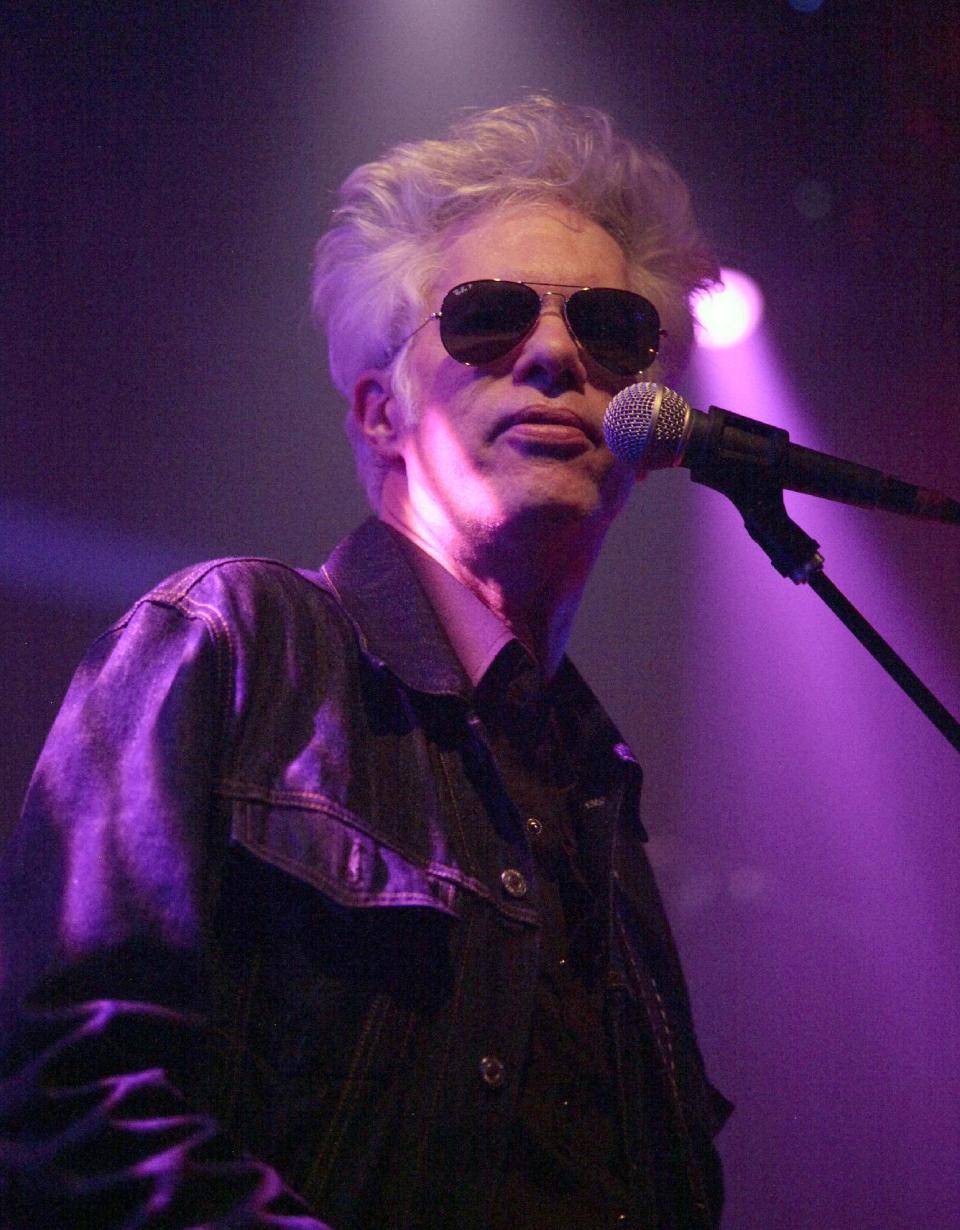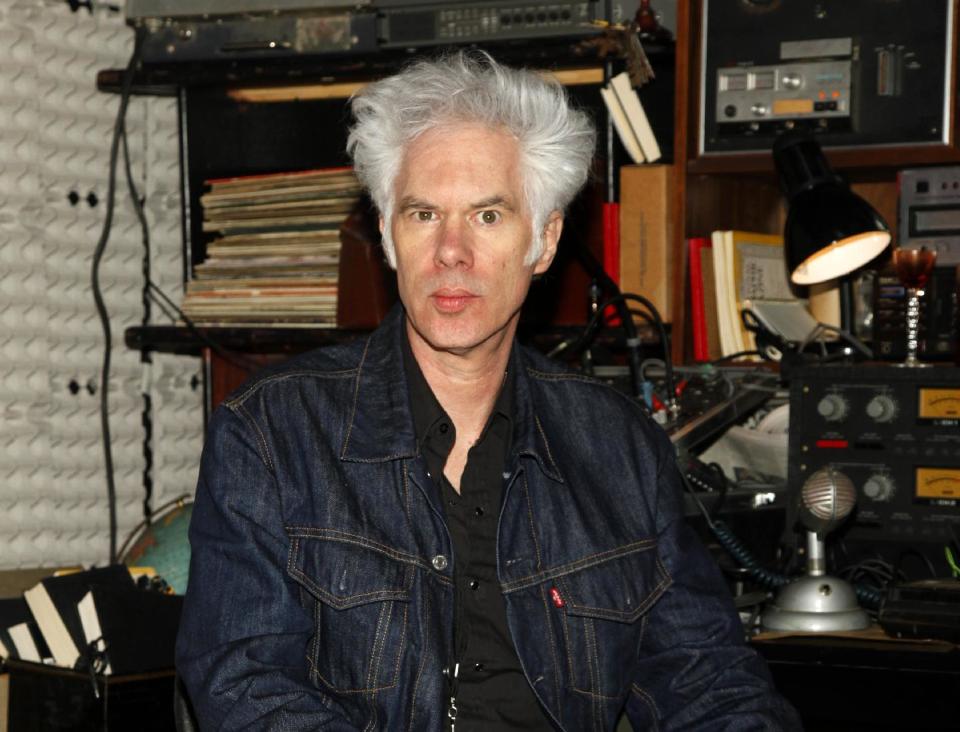With vampires, Jim Jarmusch takes the long view
NEW YORK (AP) — It's tempting to think of Jim Jarmusch's high-standing white hair as the mark of a lightning bolt that struck him long ago, leaving him forever an eager receiver for the electricity of inspiration.
"My antennae are always up. If something moves me, I want it to be part of me," he says, wringing the middle of his shirt. "I want it to be mine, whether it's 17th century English music or if it is punk rock or if it is Outside jazz or if it is Flaubert and Balzac or if it is David Foster Wallace or even if it is (crime novelist) Richard Stark."
He goes on, adding silent movies, cartoons of the Fleischer brothers, Dante. It's merely a tiny sampling. "I just collect and collect," he says, gesturing to his scribble-filled notebook, which he left open to occasionally reference during a recent midtown interview.
It's the same spirit — the nourishment of art and culture — that pervades Jarmusch's latest film, "Only Lovers Left Alive," a deadpan tale of the undead. Tilda Swinton and Tom Hiddleston star as chic, long-living vampires who, though deeply in love, are currently living separately, in Detroit and Tangier.
The film bears none of the usual genre conventions. They drink blood from sherry glasses, blissfully dropping out as if from a heroin high. But mostly, Jarmusch's languorous vampires (who were inspired by Mark Twain's "The Diaries of Adam and Eve") are vessels for taking a broad look at humanity. They're first-hand witnesses to history, reveling in all its accomplishments (from Christopher Marlowe to Motown) and despairing at its failings (the low stature of science).
Adam, morose and clad in black, collects instruments and makes music with analog equipment (supplied by Jarmusch's band, Squrl). Eve, creamy and white, fills her suitcase with books, from "Don Quixote" to the drawings of Basquiat. They may be undead, but Adam and Eve — you might call them hipsters — are pulsing with excitement for the glories of literature, music, philosophy, architecture and science — much like Jarmusch.
"I have really tried to chart my life to have as much time as I could to investigate interesting things because I feel it's my job," he says. "When I was young and had the great chance to spend some time with Nicholas Ray, he said to me several times: 'Making films is not just about studying cinema. It's about everything.'"
Jarmusch, 61, a New York icon and a godfather to the independent cinema of the 1980s and 1990s, might seem a cool, austere figure, often hidden behind shades. But in conversation, he's eager to connect, sweetly sincere in his baritone voice about the things that move him. He strives to watch a film a day, but laments that he's only up to about 50 so far this year.
He became such a sponge, he says, growing up in the suburbs of Akron, Ohio, thanks to his mother (a film critic before he was born) and his grandmother (who gave him Proust when he was 16). They were "open to many things," he says.
When he arrived in New York in the 1970s to study poetry at Columbia, further awakenings followed: riffling through used vinyl at record stores, rummaging at the Stand bookstore, spending nights at East Village music clubs. He became part of the same New York as Lou Reed, Andy Warhol and Patti Smith
From his first, micro-budget film, "Permanent Vacation," to his more recent "The Limits of Control," his films have always had their own distinct, laconic rhythm and raw minimalism. Travel is often a stimulating force of drama. Nighttime (like the nocturnal cab-ride vignettes of "Night on Earth") feels like the natural habitat for the usually black-clad Jarmusch.
He hopes that "Only Lovers Left Alive" serves as a kind of epitaph to the beauty of life: "I'm not an end-of-the-world guy, but I do think we don't have much time left," he says.
Though Jarmusch remains continually enthralled by cinema, the increasing hardships of film financing and distribution, he says, "sucks big time." It took him seven years to get "Only Lovers" made. He was also coerced into shooting on digital for the first time and, to save money, filming partly on a soundstage in Germany. "I felt like a wolf being domesticated," he says.
"I can't just play their game anymore," says Jarmusch. "I've had it, really. And I don't want to make another film under the circumstances I made 'Lovers Left Alive.'"
Instead, Jarmusch has been making music more lately, which, he says, "allow expression to come out of me." Among the many projects he's juggling is a musical theater piece about the inventor Nikola Tesla.
And though Jarmusch will always be firmly identified with New York's once-gritty Lower East Side, he now spends much of his time amid nature at his remote house in the Catskills. He calls himself an amateur mycologist and an aspiring bird-watcher.
"I had chipmunks that I fed for a while that — I never touched them — but they would walk on me," says Jarmusch. "They were so familiar. I'd come outside and they would sit right next to me. Just hanging out. Not afraid of me. They know I'm that white-haired guy that brings them food."
___
Follow AP Film Writer Jake Coyle on Twitter at: http://twitter.com/jake_coyle


